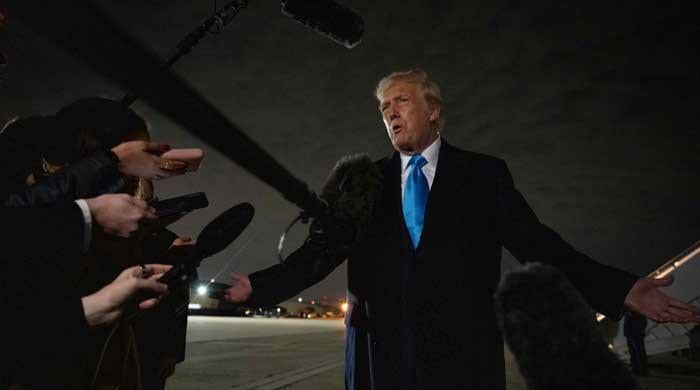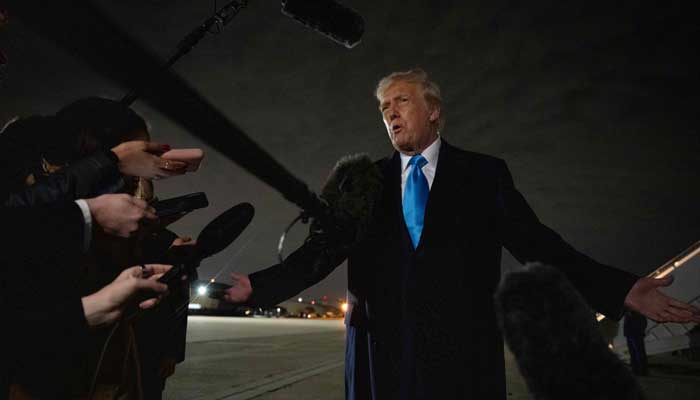US tariffs on Mexico paused for a month after border deal, says Trump


- US to prevent trafficking of high-powered weapons to Mexico.
- Trump to engage in negotiations with President Sheinbaum.
- Surprise announcement relieves some pressure on Mexico’s peso.
WASHINGTON/BRUSSELS: US President Donald Trump has paused new tariffs on Mexico for one month after Mexico agreed to reinforce its northern border with 10,000 National Guard members to stem the flow of illegal drugs, particularly fentanyl, he said on Monday.
The agreement also includes a US commitment to act to prevent trafficking of high-powered weapons to Mexico, Mexican President Claudia Sheinbaum said on X. The two leaders spoke by phone on Monday, just hours before US tariffs on Mexico, China and Canada were set to take effect.
The two countries will use the month-long suspension to engage in further negotiations, Trump said.
“I look forward to participating in those negotiations, with President Sheinbaum, as we attempt to achieve a ‘deal’ between our two Countries,” he wrote on Truth Social.
“”We have this month to work and convince each other that this is the best way forward,” Sheinbaum said at a press conference.
US stocks, which had dropped sharply on Monday morning on fears of a deepening trade war, pared their losses following the announcement. The benchmark S&P 500 was down 0.7% around 10:45am ET (1545 GMT), cutting its losses on the day in half.
The surprise announcement also relieved some of the pressure on Mexico’s peso.
Trump said on Monday he had spoken with Canadian Prime Minister Justin Trudeau and would do so again at 3pm ET (2000 GMT). The tariffs on Canada and China remain poised to take effect on Tuesday, and Canada has announced retaliatory tariffs.
A senior Canadian official told a New York Times reporter that Ottawa is not optimistic a similar reprieve is in the offing, the reporter said on X.
Speaking in Washington on Sunday after returning from his Mar-a-Lago estate, Trump indicated that the 27-nation European Union would be next in the firing line, but did not say when.
“They don’t take our cars, they don’t take our farm products. They take almost nothing and we take everything from them,” he told reporters.
EU leaders meeting at an informal summit in Brussels on Monday said Europe would be prepared to fight back if the US imposes tariffs, but also called for reason and negotiation.
Arriving at the talks, French President Emmanuel Macron said if the EU were attacked in its commercial interests it would have to “make itself respected and thus react”.
Chancellor Olaf Scholz of Germany said the bloc could respond if necessary with its own tariffs against the US, but stressed it was better for the two to find agreement on trade.
Trump hinted that Britain, which left the EU in 2020, might be spared tariffs, saying: “I think that one can be worked out”.
The US is the EU’s largest trade and investment partner. According to the Eurostat data from 2023, the United States had a deficit of 155.8 billion euros ($161.6 billion) with the EU in the trade of goods, offset by a surplus of 104 billion euros in services.
EU foreign policy chief Kaja Kallas said there were no winners in a trade war, and if one broke out between Europe and the United States, “then the one laughing on the side is China”.
Markets swoon
Economists say the Republican president’s plan to impose 25% tariffs on Canada and Mexico and 10% tariffs on China would slow global growth and drive prices higher for Americans.
Trump says they are needed to curb immigration and narcotics trafficking and spur domestic industries.
Financial market reaction on Monday reflected concerns about the fallout from a trade war. Shares in Tokyo ended the day down almost 3% and Australia’s benchmark — often a proxy trade for Chinese markets — dropped 1.8%. The mainland China market was shut for Lunar New Year holidays.
Around lunchtime in Europe, Germany’s DAX index was down 1.8%, France’s CAC down 1.9% and Britain’s FTSE 100 down 1.5%.
The Chinese yuan, Canadian dollar and Mexican peso all slumped against a soaring dollar. With Canada and Mexico the top sources of US. crude oil imports, U.S. oil prices CLc1 jumped more than 1%, while gasoline futures RBc1 rose nearly 3%.
Trump’s tariffs cover almost half of all U.S. imports and would require the United States to more than double its own manufacturing output to cover the gap – an unfeasible task in the near term, ING analysts wrote.
Other analysts said the tariffs could throw Canada and Mexico into recession and trigger “stagflation” – high inflation, stagnant growth and elevated unemployment – at home.
In Europe, economists at Deutsche Bank said they were currently factoring in a 0.5% hit to gross domestic product (GDP) should Trump impose 10% tariffs on the bloc.
National emergency
A White House fact sheet gave no details on what Canada, Mexico and China would need to do to win a reprieve.
Trump vowed to keep the sanctions in place until what he described as a national emergency over fentanyl, a deadly opioid, and illegal immigration to the United States ends.
China called fentanyl America’s problem and said it would challenge the tariffs at the World Trade Organisation and take other countermeasures, but also left the door open for talks.
Canada said it would take legal action under the relevant international bodies to challenge the tariffs.
Automakers would be particularly hard hit, with new tariffs on vehicles built in Canada and Mexico, burdening a vast regional supply chain where parts can cross borders several times before final assembly. Ford F.N and General Motors GM.N shares fell between 4% and 5%.



